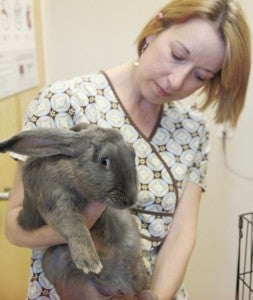Wanted: Bunny parents
Published 10:53 pm Thursday, May 2, 2013
Employees at a Carrollton veterinary hospital are hoping they can find new homes for 22 rabbits that wound up in their care after being rescued from a bad situation.
Animal Clinic of Eagle Harbor is hoping to find new homes for the cute critters, rescued from what hospital manager Ellen Norris called a “breeder-turning-into-a-hoarder” situation in Louisiana.

Ellen Norris, hospital manager at Carrollton’s Eagle Harbor Veterinary Clinic, which has 22 rescued rabbits available for adoption, said the animals make great pets.
Available for adoption are three baby and five adult dwarfs, four baby and two adult lionheads, seven baby Flemish giants and one baby rex.
Norris, who was told about their plight by “an old colleague,” said the plan had been to shoot the bunnies.
“She just took on too much and was not able to care for them,” she said of the animals’ previous owner.
“The email I got from my colleague, who was dealing with the situation, said they were going to be shot. They weren’t abused, but they certainly weren’t getting the best care they could have.”
Rabbits reach sexual maturity more quickly than dogs and cats — hence their reputation for prolificacy — but Norris said the window of opportunity is still open to spay and neuter the rescued animals before multiplication gets out of hand.
“They’re still at the age where we don’t have to worry about breeding,” she said. “By the time they are six months (old), we want them all spayed and neutered.”
In many respects, according to Norris, rabbits are easier to care for than dogs or cats, especially when it comes to toilet training.
“I would say they are good companions, a lot like a cat or a dog,” she said.
“We have a Flemish giant, and he’s just like a dog – he runs around and does all sorts of things. I don’t think people know how entertaining and funny they are.”
Smaller rabbits, like the dwarfs, are more like smaller dogs, she said. “They think they are the boss and get into trouble.”
Those breeds live for 10 to 12 years, while larger rabbits keep hopping for six to 10 years, she added.
Rabbits do not require vaccinations, but veterinarians recommend annual check-ups. Their teeth “constantly grow,” creating problems if they can’t wear them down on their own, Norris said.
The animals need “plenty of fresh water, not a lot of vegetables, and mostly hay and pellets.”
“They do eat electrical wires, so you have to bunny-proof your house,” Norris cautioned.
The veterinary hospital is looking for donations of vegetables, hay and litter, as well as loving homes.
To inquire, call 238-2738 or visit the clinic’s Facebook page.





